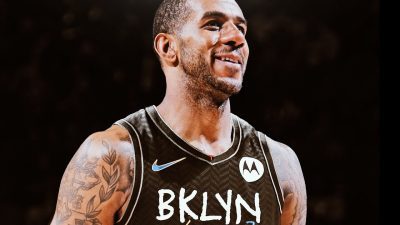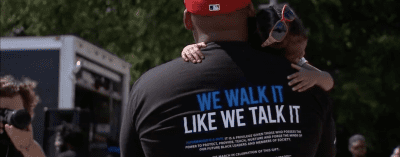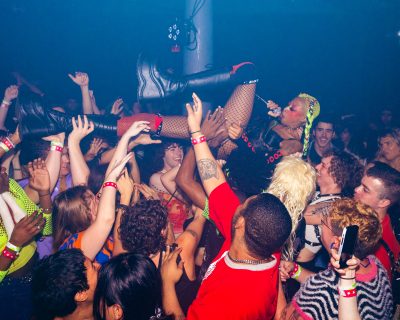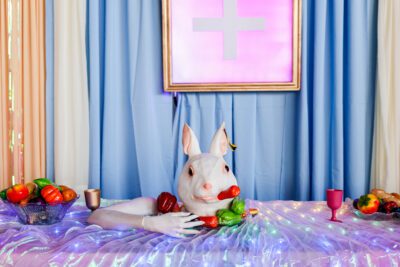The Roots’ ‘Captain’ Kirk Douglas dives into the ‘Unknown’
The guitarist discusses his solo album, 'New Unknown,' empathy, 20 years with The Roots — and the Park Slope Food Coop
Like what you’re hearing? Subscribe to us at iTunes, check us out on Spotify and hear us on Google, Amazon, Stitcher and TuneIn. This is our RSS feed. Tell a friend!
Folks who are even casually familiar with the seminal hip hop band The Roots will certainly know who Questlove is, the band’s leader and highly visible multi-hyphenate drummer. They’ll maybe even know who Black Thought is. The group’s super dynamic emcee.
But, for the past 20 years, “Captain” Kirk Douglas has been a powerhouse in his own right, a central force in the band as its guitarist and vocalist, guitar being a rare instrument for a hip hop collective. Douglas has played on a string of critically acclaimed and occasionally Grammy-winning top 10 albums, including “The Tipping Point,” “Game Theory,” “Rising Down,” “How I Got Over,” and “Wake Up” with John Legend.
And on Friday he released “New Unknown,” his second solo album under the moniker Hundred Watt Heart. Introspective, occasionally borderline psychedelic with loads of guitar, Kirk’s vocals, and a lot of rock, it’s maybe not what you’d expect from a member of The Roots. But it’s also not not what you’d expect given the musically omnivorous nature of the band, which has been Jimmy Fallon’s house band since 2009.
Today, “Captain” Kirk — who was born in Brooklyn, grew up in Long Island and is back in Brooklyn by way of Manhattan — joins me as a guest on “Brooklyn Magazine: The Podcast.” Unlike the other members of his band, there is not a Philly bone in his body. He joins me to talk about the new album, its first three singles, and what it’s been like being in the Roots for two decades. He joined in 2003, after the Roots had already been performing together in some form for 15 years. Obviously, we also talk about the Park Slope Food Coop.
The following transcript of this podcast episode has been edited for clarity and flow. For the full conversation, click play to listen above or subscribe wherever you get your podcasts.
As we established before the mics were on, we’re semi neighbors. You’re still in Brooklyn, right?
I still am in Brooklyn. I’m in Crown Heights, Little Caribbean, Little West Indies area. Prospect Lefferts Gardens area, around there.
What’s your go-to, people coming in from out of town, you got to try XYZ restaurant or…
Well, a new fondness of mine is Flamingobaby Kitchen. I don’t know if you’re familiar with that, but it’s a Caribbean spot that’s actually more close to Park Slope. That is on Union across from the Park Slope Food Coop. I am a Park Slope Food Coop member.
I was a member for eight years. What’s your job?
Pre-pandemic, it was childcare. So I would go in, my shift was always the eight o’clock shift and I’d go in, I’d bring my guitar. And at times when it was welcome and useful and fun for the kids, I would play the classics, the kid classics. Sometimes, it would be slow and sometimes I would write in that instance. Sometimes ideas would come, sometimes I’d figure stuff out. Sometimes I’d play and kids would begin crying as opposed to stopping. And then it’d be time to put the guitar down.
There’s going to be some kid who grows up to say, “‘Captain’ Kirk did my daycare when my mom was shopping, or dad.” It’s incredible.
Well, I’ve already had that experience from my actual preschool teaching days. I’ve definitely encountered my former students as adults with children of their own. My current go to job now is that of the walker. Like Caine from “Kung Fu,” get to walk the Earth.
You escort people home.
Or to their cars. And you get all these nice New York stories. Sometimes you get recipes and food recommendations, and just little slice of New Yorkers’ lives. I really enjoy that. And on a sunny day, it just puts me in a good mood and I really enjoy it.
We’re talking today, not because of the Coop, but you have an album out, last Friday. “New Unknown.” You’re recording under A Hundred Watt Heart. You haven’t had a solo album since 2019, right? Is this some sort of pandemic baby?
That’s exactly what it is. And I just find myself at a time now looking back at when the record was being made over the past two years, and just thinking to myself, “If I was to make an album now, it would require so much negotiation and shifting of time and making time and ignoring aspects of my life.” But for this record, the time was just there for the taking. And it almost just feels dream-like when I look back at working on the songs and recording the songs and refining the songs. It was just at a time when I simply had the time to do that. Shows just felt like a thing of the past, and a thing of the unforeseeable future, at the time. I guess that’s why the record was called “New Unknown …”
Just, that’s where we were.
The future’s always, always going to be unknown. But this was the type of unknown that I’d never encountered before, that sort of feeling. So it just felt very apropos.
Fans of The Roots, if they haven’t heard your solo stuff before, it’s sonically different. I mean we can go single by single. “Breathe In” is the latest and third single that came out?
Yes. The third single was “Breathe In.” “Over the Ocean,” and the single before that was “We Can Be One.” So, all vastly different from the other one.
Which is what I was going to say, “Breathe In” is sort of psychedelic. It sounds like an REM song almost. It’s very meditation-y. There’s a kind of psych vibe to it. Is it about self care? You’re breathing in? Is that intentional?
First come the chords, and then comes the melody, and then the melody sort of helps to lead what the words will be. And so I’m sort of half led by the sound of the melody and what it invokes in me. And also partially led by whatever situational things are going on in my life in the world around me. And at that particular moment, I was dealing a lot with family, and just people that were having a really hard time with the pandemic.
I know people that haven’t made it through the pandemic, and not because of Covid itself, but because of just feeling that they were living in a world that they were not built for. There’s some people that had the mindset, “Hey man, this is what we have to do to pull together to make it to the other side of this.” And there’s some people that were like, “I can’t do what’s being asked of me to make it to the other side of this.” And for those people, it’s really sad. It’s a type of situation. You can’t go in and change somebody’s reality.
You can’t just say, “Just pull yourself up, or get through it.”
No, no. if we’re really empathetic with people in their situations, it would seem like there would have to maybe there be another way. So for those people in that circumstance, and then we’re talking about, okay, I know it’s very hard for you to be in this world right now, but I’d like you to be in this world anyway, where you have family that wants you to be in this world anyway, We’re in a time now where you can sort of find your people that feel the same way that you feel, and a support for one another. At the most basic level, the idea of nothing being permanent.
“This too shall pass.”
Exactly. Then that sentiment that’s been echoed throughout history, but it’s also when you’re really in the middle of needing that sort of advice, it’s a really hard place to be. I was talking to a friend that leads meditations and classes about mindfulness and one thing he said was, “Nobody’s here because they want to be here. It’s like some circumstance led them to this place.” And there’s the quote, “The wound is where the light comes in.” As far as enlightenment, whatever you want to call it, so much comes from going through hard times. For many, it was a hard time and now we’re seeing a world where we’re sort of getting to another side of things.
Knock on wood.
I’ll just say it straight up, I know somebody that literally killed themselves because of what was going on. And I wish that they were around now to see that it is possible for things to look up, to get on the other side of things. But it doesn’t take away the fact that it is challenging and that’s why art exists, as a way of working through the challenges that we have in life. So that’s what that single’s about.
And then the one right before was “Over the Ocean,” which is the idea of keeping your head above water as you’re struggling — maybe not struggling, but you’re just trying to get through. Is that a sort of thematic thing throughout, or am I misreading?
it’s thematic. It has a lot to do with living in a time when so much of our interactions taking place on social media and online and seeing so much anger and so much negativity. And in the chorus of that song it says, “Conversation turns into emotion and if we check the source of the emotion, truth comes to light. Light shall return.” The source of the emotion. The idea of thinking about why people are upset and what brings people to a place where they’re reflecting hatred, trying to understand the why’s of things and how people get to a place before passing judgment.
You have that show “Euphoria,” you see these characters that are just, appear to be just so out of line. And then you look at their backstory and you get a peek as to how they came to be the way that they are. I know it’s just a TV show, but…
It certainly resonated.
Yes. That’s sort of the human condition. We get to the point where you arrive at a certain place and you have all these wounds, you have all these impressions, you have all the people that you’re surrounded by. And that just brings you your worldview. And the only way for empathy to happen is for conversation. But it’s also overwhelming. And at the end of the day, we all are human beings that want love. We want to love and be loved. Generally speaking, when I’m out in the world, I go anywhere, somebody’s always holding the door open for me. People are generally cool. I guess, that’s why throughout life, I’ve always heard since I was a young boy, “Oh, you don’t talk about politics, you don’t talk about religion.” And that was way before the internet.
I was raised the same way.
Yeah. It’s just fuel-injected now. When you think of how people are able to speak recklessly, there’s a lyric in the song, “we love to hate when we’re behind closed doors. And if that’s innate, maybe that’s what love is for.” Our human nature. When you think of our actual human nature.
As a preschool teacher, working with kids, I’ve seen, in most situations, a kid’s first inclination if there’s like a toy, two kids want to play with the toy, the first reflex is to try to get the toy for themselves. To have the idea of, “Hey, let’s negotiate and you play with this first and then I get to play with it.” That’s something that’s learned through nurturing. That’s something that’s learned from stopping and having a conversation and explaining how the other person feels. So the whole concept of everything I needed to learn about life, I learned in preschool. There’s a truth to that, because that’s sort of the basic building blocks of human interaction.
Where were you teaching? You were born in Brooklyn and you grew up in Long Island. Were you teaching in New York?
.First I worked with the developmentally disabled when I was on Long Island. And then I moved to Manhattan. And then, I started to work with preschoolers, when I moved to Manhattan. I lived in Chelsea and I worked at Greenwich House Preschool. And I was an assistant preschool teacher there.
And you were a budding musician at the same time, I would imagine.
During the day, I was teaching preschool. I’d play music with them. And at night, I was playing in CBGBs Wetlands, Joe’s Pub, all those spots.
Two very different scenes. You were burning the candle of both ends a little bit.
Yeah, when I had youth on my side.
For fans of The Roots who may expect a certain sound or become accustomed to a certain energy from The Roots, what do you want them to expect or take away from your solo stuff or this record?
Well, I think anybody that knows hip hop well knows that hip hop comes from all sorts of music. And anybody that knows The Roots, even if the only person you know in The Roots is Questlove. And if you follow him, you probably should by now understand that he has a different, vast range of musical taste. So I would hope that they would get from hearing my music is just seeing a branch of what The Roots are doing. It’s a lot more based on melody and songwriting, and it’s a different sort of songwriting. It’s coming from a different direction. And I just get to express that, which I don’t get to express in the context of The Roots. So it’s really for anybody who it would resonate with.
I saw you guys at the Prospect Park Bandshell show that you did last summer. It was amazing. Great show. There were a lot of different styles. You guys did covers, as well as original stuff. And what impressed me about that show was that you each had a moment where it was each individual member’s big spotlight. You have a moment where you can shine and do your thing. Is that a deliberate dynamic built into the band, where you are working together as a unit, but you each have space to breathe, contribute, or what’s that negotiation?
Like you say, it basically gives it a spotlight for everybody in the band. But also the idea is to keep a party going, for people that have never seen The Roots before. They’re trying to cater to the people that are familiar with our catalog, but also the people that may have never heard any Roots song before. And the idea is to keep this party going, and the band sort of performs not unlike a DJ set from Questlove.
I think you were covering the Meters, you went to the JB’s, to Herbie Hancock, and beyond, stylistically.
But there’s also an aspect of introspection that if you’re not familiar with it, it may get lost in the translation in a live setting. The Roots have a lot of introspective songs on some of our albums, but some of those songs we don’t do in a live context, because it just may not be completely appropriate for the type of person coming to see a hip hop show.
So I guess that’s why in an album that I’m doing, I too like to express music that reflects introspection. There’s got to be a place for it. If you think about this experience of life, the album for me is a time capsule that when I hear it, no matter 10 years from now, 20 years from now, I can listen to that and however far I’ve moved on, I can listen to that album and think about that time in my life when the world shut down. When my wife and kids went to Denmark, and the only place I had to be was at 30 Rock for a certain amount of the day, and either home to my empty apartment or home to my mom, and have dinner with her. And all the bars were closed, all the parties were closed, there were no concerts. New York was not the New York that people have in mind when they want to move here from all over the world. New York was just, in a sense, put to sleep for a little bit.
I remember it well. Not fondly, but well. Although there were moments of grace and very sweet moments and then fun moments too that were able to materialize because of the bizarre circumstances. But I didn’t realize your wife and kids were away that time. That must have been incredibly difficult.
I didn’t realize I was making an album at that time. I just had my head down in something that was making me feel better about my circumstances. And that type of musical immersion was something I hadn’t felt since I was a teenager. So many people did so many different things with that time. There was no rule book. You didn’t have to be productive at all. You could have just caught up on all the shows that you’ve missed out on that you’ve heard people talking about.
And for me, there was a whole bunch of fragmented melodies and song ideas that were only just that, song ideas. And I had time to marinate on them and bring them to fruition. And really obsess over the recording process and learn about how to record myself.
Was it all recorded at home or I’ve heard you talk about Electric Lady; did you do stuff there?
No, no. My last record was done at Electric Lady Studios. And for this time around, I wanted to record in the place I felt really comfortable in. So much of it is about capturing a moment. And when you’re comfortable, you can definitely get a certain kind of magic out of that situation. All the drum tracks were recorded in the basement of my mom’s house. The home and the site of many a New Year’s Eve party. I’m trying to think if my virginity was actually lost in that room. It’s highly likely. If not the first time, at least the second time.
It’s in the same room that I learned about music, and learned so much. The room that I’ve discovered so many albums in. And to be able to take that music that you recorded in that space and put it on the same stereo in that space and have it come out of the speakers and it s was recorded here, but this sounds like it’s from somewhere else. And that’s somewhere else is from inside my soul. The process was sort of like a gift to myself.
After the record was done, I was like, “Okay, I want to gift myself something.” So I reached out to an artist on Instagram by the name of Sarah Stewart. And I dug her artwork. I thought it was really sort of psychedelic and expansive. And I reached out to her and I was like, “Sorry to slide in your DMs like this, but if I send you some music and if I pay you for your services, could you create to this? As long as you can listen to it?” She said she’d be into it. And what she came up with and what she sent back to me just at first, I was just overwhelmed. And I just thought, “Okay, is the music even able to do this art justice?” And then she’s like, “Well, this is what your music moved me to do.”
That’s a lovely conversation.
Yeah, so that exchange right there with somebody that I had never met. I mean this is also, I don’t want to sound like the old man yelling at the cloud about the internet, but it’s undeniable the beauty that can come from it. And with this person I’ve never met, it’s like when you meet somebody and they are into you and there’s that feeling of, “Wow, I’m into this person. I can’t believe this person’s into me. But it feels really good.” There’s a love in that.
Making the video for “We Can Be One” was from a dude I met at the Coop that winds up living in my building. I’m saying I should do a video for this. I’ve never done a video before, don’t really feel like doing it. But I just know that that’s a necessary evil to make one’s own video.
“We Can Be One.” This is the song that’s got an Afrobeat vibe to it, almost. Very different sounding than the other two.
And while I was making the video, there was a feeling of, “I don’t know what the hell I’m doing here. This feels weird.” I’m sort of putting myself out there. It’s sort of thrilling. And it’s way more safe than, say, bungee jumping. It’s like a different kind of thrill. And then to see the outcome, it’s just like, “Whoa, I’m really glad that I did that.”
I think a lot of great art and great work comes out of that place where you’re either afraid or you’re outside of your comfort zone. You haven’t done this before. And you learn by going through it and getting to the other side. And even if it doesn’t succeed, you’ve at least learned something and put yourself out there.
The quote is, “Out of your comfort zone is where the magic happens.” I believe in it. This experience of making this record has proven that to me.
We were talking about Weird Al him before we were recording. You are in your dressing room at the Tonight Show right now at 30 Rock?
Yeah. That’s where I’m speaking to you from.
And you said you had just done the children’s music instrument bit with Weird Al. I saw Weird Al once, maybe 20 years ago. He was in Hollywood and I think he opened for John Spencer Blues Explosion. It was a wild show. His set was one of the most punk rock things I think I’ve ever seen.
Wow. He’s got a lot of energy. We did a medley, and you sort of get the impression that all the things that he has parodied over the years, he covers it and attacks it like a fan of the music. And he’s just very enthusiastic and very much into what he’s doing. I haven’t seen him live, but while we were recording it, Questlove tapped me on the shoulder and he was like, “Yo, I was at his show over the weekend and it’s legit. What he’s doing is legit.”
I saw him post about it. Weird Al was at Carnegie Hall. I had heard that that was happening, and I was like, “Maybe I should get tickets.” And I regret not. Speaking of Questlove, you joined The Roots in 2003?
That’s correct, yes.
Next year is your 20th year with The Roots, which is incredible. What do you think about when you think about that fact? I can’t imagine you would’ve thought, this is a 20 year endeavor I’m about to embark on.
Man, it’s been a wild ride. It’s amazing the types of things that can feel sort of normal for your life. It’s been kind of a dream come true. In some ways, it feels I was really made to be in the band. Interacting with everybody, everybody’s humor, it just feels I’ve been drafted into this school/brotherhood where you sort can design your own curriculum. When I look at the album I did, “New Unknown,” I kind of look at it as sort of a project. The Roots, it’s like a college and I had to turn in — I didn’t have to turn into them per se — but just I had to kind of turn it into the universe.
It’s like a thesis.
It’s like the universe brought me into this school, and I have to do something with it. And this is just my own imagination. And that’s sort of the beauty of life. You can really mythologize the whole thing and you are right or not. It’s your own reality. I just know that at the time when I saw The Roots, I remember watching them from the audience with a bunch of people at the Knitting Factory, 74 Leonard Street, and thinking, “Man, I would love to be in a band like this. I could see myself being in a band like this.”
And then I probably had that thought come to me in 1997, and then I was auditioning for the band in 2003. And in the meantime, I was working on my own music, playing with a bunch of different people. And all of those interactions, all those connections were all part of my curriculum, too. As far as my continued education as a parent, that’s also part of my schooling, too.
Throughout this conversation, you’ve been consistently very introspective. You sound like you’re open to self realization, self criticism, self awareness in a way that it’s been a sort of a theme throughout. Where do you think that comes from? Because not everyone’s like that.
Being a parent changes you. So there’s that. I’m extremely fortunate, and I know it, so there’s that. I think it would be different if I was going through the things I’m going through and I wasn’t thankful about it. As a 16-year-old, I was a huge Living Color fan. I saw them on Long Island as a suburban Black kid that was into rock and roll. I saw them on MTV and I was like, “Oh, so you actually can do this?” And last night, I played on stage with them at the City Winery, Flava Flav came up on stage, too. Paul Schaffer was also there up on stage. And we did “911 Is a Joke.” We did “Sunshine of Your Love,” the Cream song. And I was just thinking it’s like, “Man, if my 16-year-old self could see this, it just would be in complete disbelief.”
Well, you became friends with Vernon Reid early in your career. Wasn’t he playing with the Roots when you saw them in the ‘90s?
He was. That’s exactly right. When I saw them at the Knitting Factory, he was there playing guitar. Earlier that day, I saw him when I was on my way to a gig with the drag queen Hedda Lettuce. And that’s when I told Vernon, I was like, “Oh, I’m going to see this band The Roots tonight.” He’s like, “Oh, I’m going to sit in with them tonight, actually.”
You talk about introspection. I guess I sound like somebody that’s been in The Roots for 20 years. I guess that’s what you’re supposed to sound like. And the feeling is, you want to keep progressing. And there’s so many ways to keep progressing. There’s so many aspects of music. There’s music theory, there’s performance, there’s recording, there’s songwriting, and then there’s just how to live optimally, just on your physical self. In these 24 hours in the day that we’re all given, it’s just what you do with them. It’s always a challenge to use those hours as wisely as possible and check all the boxes of checking in with your family, with yourself, with treating yourself right, with doing something to improve.
Check out this episode of “Brooklyn Magazine: The Podcast” for more. Subscribe and listen wherever you get your podcasts.
You might also like 


























